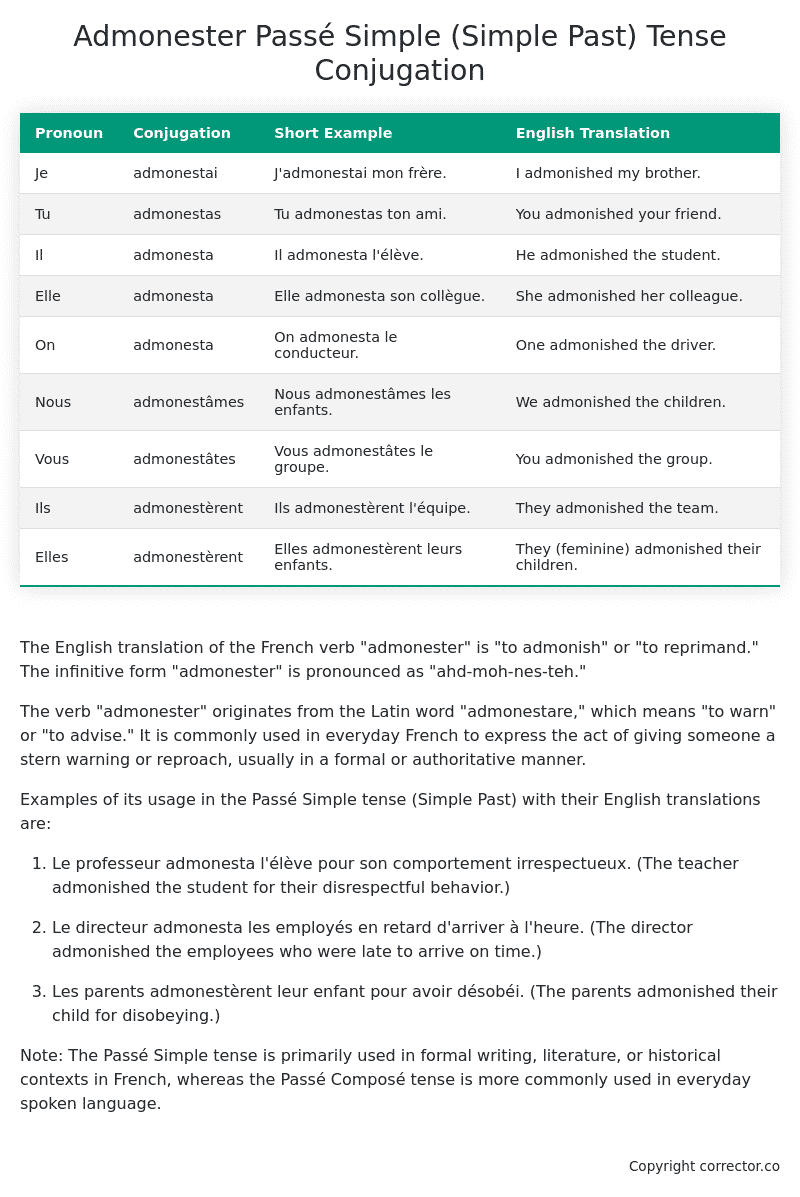Passé Simple (Simple Past) Tense Conjugation of the French Verb admonester
Introduction to the verb admonester
The English translation of the French verb “admonester” is “to admonish” or “to reprimand.” The infinitive form “admonester” is pronounced as “ahd-moh-nes-teh.”
The verb “admonester” originates from the Latin word “admonestare,” which means “to warn” or “to advise.” It is commonly used in everyday French to express the act of giving someone a stern warning or reproach, usually in a formal or authoritative manner.
Examples of its usage in the Passé Simple tense (Simple Past) with their English translations are:
-
Le professeur admonesta l’élève pour son comportement irrespectueux.
(The teacher admonished the student for their disrespectful behavior.) -
Le directeur admonesta les employés en retard d’arriver à l’heure.
(The director admonished the employees who were late to arrive on time.) -
Les parents admonestèrent leur enfant pour avoir désobéi.
(The parents admonished their child for disobeying.)
Note: The Passé Simple tense is primarily used in formal writing, literature, or historical contexts in French, whereas the Passé Composé tense is more commonly used in everyday spoken language.
Table of the Passé Simple (Simple Past) Tense Conjugation of admonester
| Pronoun | Conjugation | Short Example | English Translation |
|---|---|---|---|
| Je | admonestai | J’admonestai mon frère. | I admonished my brother. |
| Tu | admonestas | Tu admonestas ton ami. | You admonished your friend. |
| Il | admonesta | Il admonesta l’élève. | He admonished the student. |
| Elle | admonesta | Elle admonesta son collègue. | She admonished her colleague. |
| On | admonesta | On admonesta le conducteur. | One admonished the driver. |
| Nous | admonestâmes | Nous admonestâmes les enfants. | We admonished the children. |
| Vous | admonestâtes | Vous admonestâtes le groupe. | You admonished the group. |
| Ils | admonestèrent | Ils admonestèrent l’équipe. | They admonished the team. |
| Elles | admonestèrent | Elles admonestèrent leurs enfants. | They (feminine) admonished their children. |
Other Conjugations for Admonester.
Le Present (Present Tense) Conjugation of the French Verb admonester
Imparfait (Imperfect) Tense Conjugation of the French Verb admonester
Passé Simple (Simple Past) Tense Conjugation of the French Verb admonester (You’re reading it right now!)
Passé Composé (Present Perfect) Tense Conjugation of the French Verb admonester
Futur Simple (Simple Future) Tense Conjugation of the French Verb admonester
Futur Proche (Near Future) Tense Conjugation of the French Verb admonester
Plus-que-parfait (Pluperfect) Tense Conjugation of the French Verb admonester
Passé Antérieur (Past Anterior) Tense Conjugation of the French Verb admonester
Futur Antérieur (Future Anterior) Tense Conjugation of the French Verb admonester
Subjonctif Présent (Subjunctive Present) Tense Conjugation of the French Verb admonester
Subjonctif Passé (Subjunctive Past) Tense Conjugation of the French Verb admonester
Subjonctif Imparfait (Subjunctive Imperfect) Tense Conjugation of the French Verb admonester
Subjonctif Plus-que-parfait (Subjunctive Pluperfect) Tense Conjugation of the French Verb admonester
Conditionnel Présent (Conditional Present) Tense Conjugation of the French Verb admonester
Conditionnel Passé (Conditional Past) Tense Conjugation of the French Verb admonester
Conditionnel Passé II (Conditional Past II) Tense Conjugation of the French Verb admonester
L’impératif Présent (Imperative Present) Tense Conjugation of the French Verb admonester
L’impératif Passé (Imperative Past) Tense Conjugation of the French Verb admonester
L’infinitif Présent (Infinitive Present) Tense Conjugation of the French Verb admonester
L’infinitif Passé (Infinitive Past) Tense Conjugation of the French Verb admonester
Le Participe Présent (Present Participle) Tense Conjugation of the French Verb admonester
Le Participe Passé (Past Participle) Tense Conjugation of the French Verb admonester
Struggling with French verbs or the language in general? Why not use our free French Grammar Checker – no registration required!
Get a FREE Download Study Sheet of this Conjugation 🔥
Simply right click the image below, click “save image” and get your free reference for the admonester Passé Simple tense conjugation!

Admonester – About the French Passé Simple (Simple Past) Tense
Formation
Usage
Narration
Historical Context
Interactions with other tenses
Passé Composé
Imparfait
Conditional and Subjunctive
Summary
I hope you enjoyed this article on the verb admonester. Still in a learning mood? Check out another TOTALLY random French verb conjugation!


